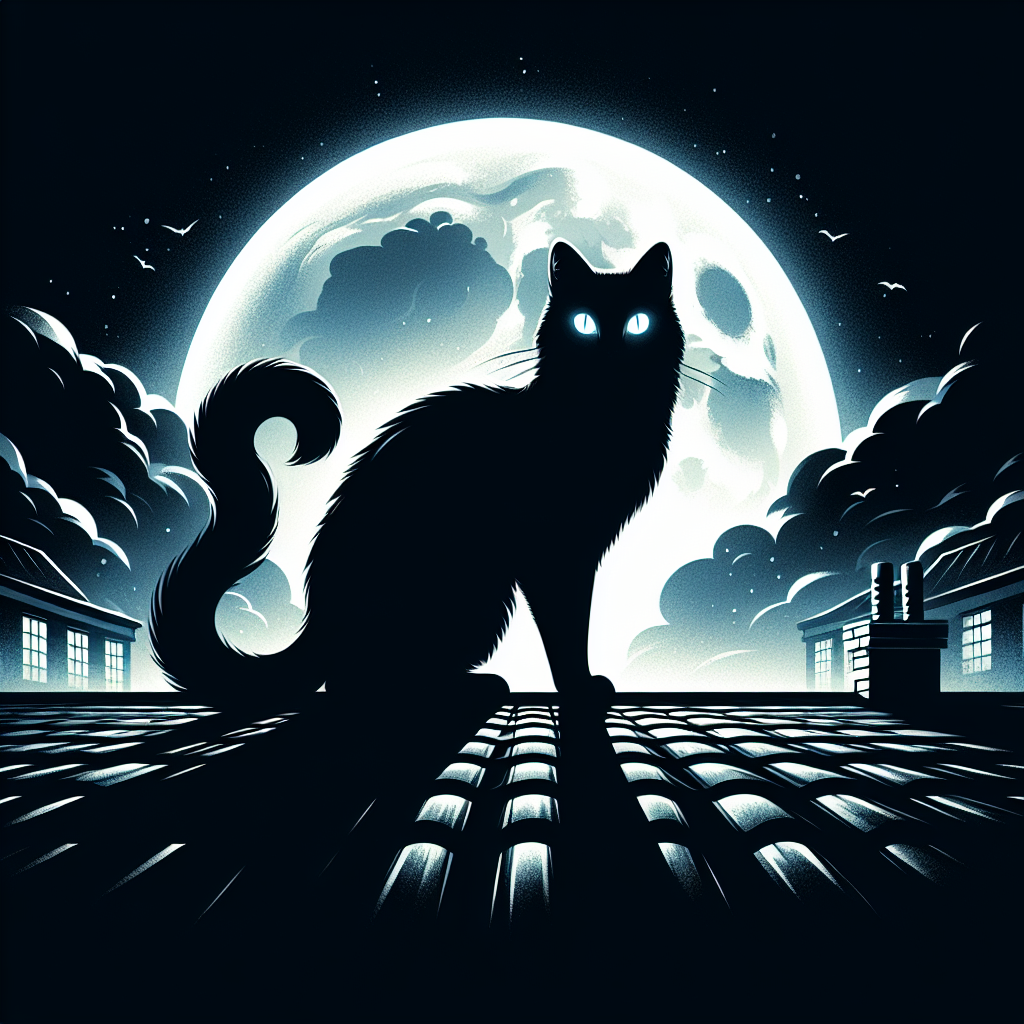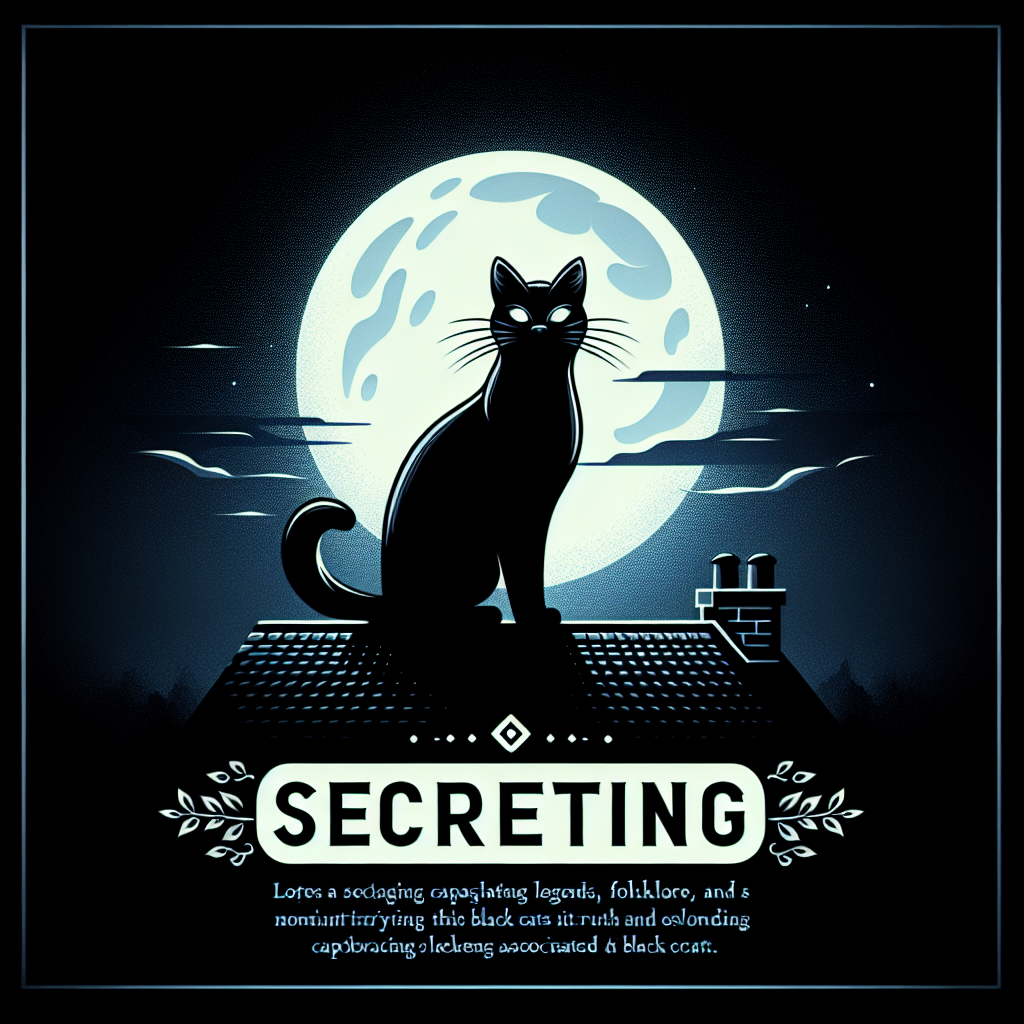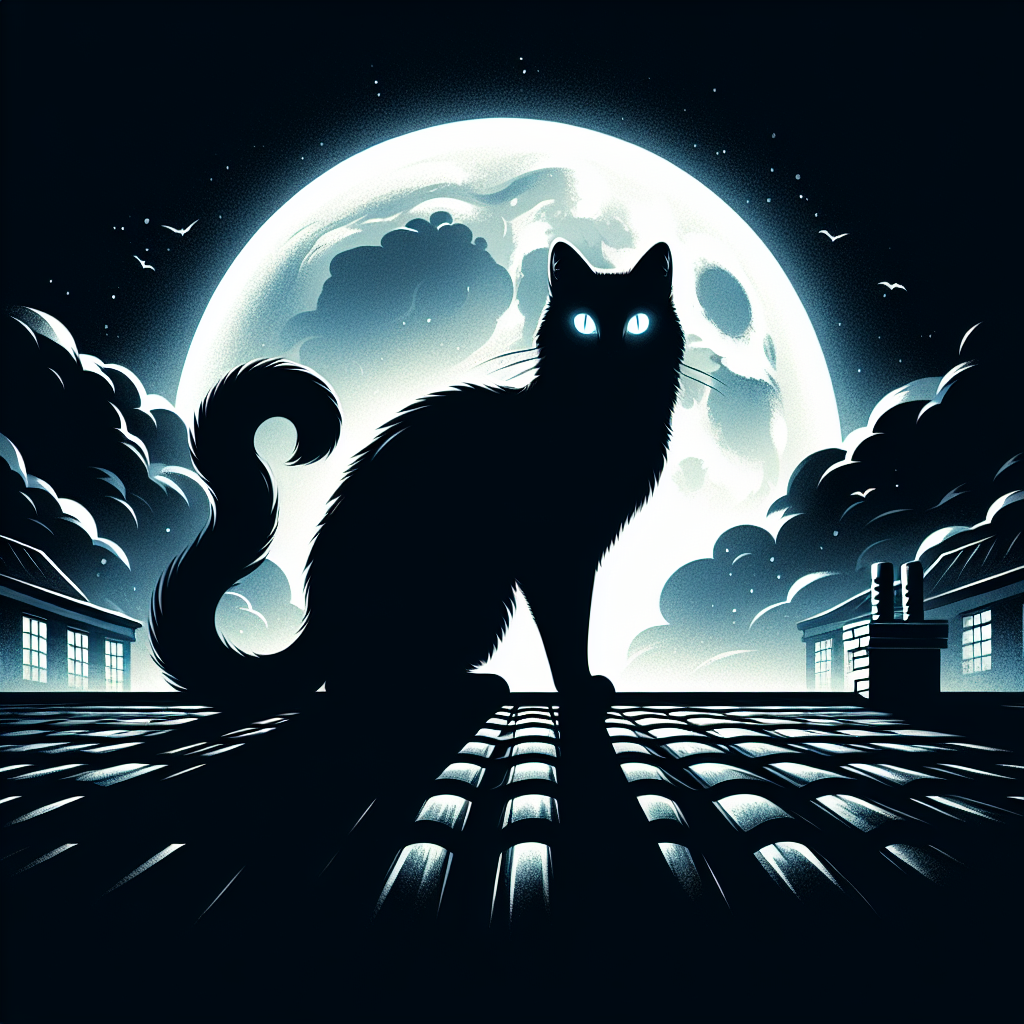Black cats have long captivated our imaginations and sparked curiosity. In this intriguing article, we unravel the mystery surrounding black cats and explore whether they are truly tabby cats in disguise. Prepare to explore the fascinating world of black felines and uncover the secrets behind their sleek and mysterious exteriors.
The History of Black Cats
Black Cats in Ancient Times
Black cats have a long and fascinating history that dates back to ancient times. In many ancient civilizations, black cats were considered sacred or revered creatures. For instance, in ancient Egypt, black cats were highly esteemed and worshipped as symbols of good luck and protection. They were associated with the goddess Bastet, who was depicted as a lioness-headed woman with the body of a domestic cat. The ancient Egyptians believed that keeping a black cat in their homes would bring them prosperity and guard against evil spirits.
Black Cats in Middle Ages
However, the perception of black cats took a turn for the worse during the Middle Ages. In Europe, particularly during the time of the infamous witch trials, black cats became associated with witchcraft and were believed to be companions of witches. This negative association led to widespread superstitions and fear surrounding black cats. Many innocent black cats were killed during this time, as they were believed to be the embodiment of evil.
Superstitions and Beliefs
Throughout history, black cats have been the subject of numerous superstitions and beliefs. One such belief is that if a black cat crosses your path, it is a sign of bad luck or impending doom. This superstition originated from the Middle Ages, when the association between black cats and witches was at its peak. Similarly, black cats are often seen as symbols of bad luck, particularly when they are associated with Halloween. Many people still avoid black cats during this season, fearing that they may bring misfortune.
Black Cats in Different Cultures
Egyptian Culture
In ancient Egyptian culture, black cats held a significant place. As mentioned earlier, they were revered and worshipped as divine creatures associated with the goddess Bastet. The ancient Egyptians believed that black cats possessed magical powers and brought good fortune to their owners. It was common for Egyptian households to have black cats as both companions and protectors.
Celtic Culture
In Celtic culture, black cats were also esteemed and believed to have supernatural abilities. They were associated with the spiritual world and were considered as guardians against evil spirits. Black cats were often seen as companions of witches or magical beings, and it was believed that they possessed the ability to bring good fortune and ward off malevolent forces.
Japanese Culture
Black cats have a unique place in Japanese culture as well. Known as “kuro neko,” which translates to “black cat” in English, these feline companions are considered to bring good luck and fortune. In Japanese folklore, it is believed that a black cat crossing your path from right to left is a sign of good luck approaching, while from left to right is a warning of impending misfortune. Black cats are often depicted in Japanese art and are even considered a symbol of prosperity.
American Culture
In American culture, the perception of black cats has been influenced by various beliefs and superstitions. While some people still hold negative views towards black cats, associating them with bad luck, others appreciate and adore them. Black cats are often associated with Halloween and are considered an iconic symbol during this holiday. Many people even consider adopting black cats as a way of embracing the season’s spirit.

Black Cats in Folklore and Mythology
Black Cats as Familiars
One of the most popular beliefs surrounding black cats is their association with witchcraft and their role as familiars. Familiars are believed to be magical companions or spirits that assist witches in their rituals and spellcasting. In folklore and mythology, black cats are often depicted as loyal and intelligent familiars. Despite their association with witchcraft, it is important to understand that these beliefs are purely mythical and do not reflect the true nature of black cats.
Black Cats in Witches’ Lore
Black cats’ connection to witches can be traced back to the Middle Ages when black cats were associated with witchcraft and were believed to be able to take on the form of witches or be their companions. This association led to the unfortunate persecution of black cats during the witch trials, as they were seen as a manifestation of evil and a symbol of witchcraft. However, in reality, black cats are simply cats with black fur and do not possess any supernatural powers.
Black Cats in Egyptian Mythology
In ancient Egyptian mythology, black cats held a sacred place. The goddess Bastet, often depicted as a lioness-headed woman with the body of a domestic cat, was closely associated with black cats. Bastet was the goddess of home, fertility, and protection. Black cats were believed to carry the essence of Bastet and were seen as protectors against evil spirits and bringers of good fortune. They were regarded as sacred beings and were even mummified alongside their human owners.
The Symbolism of Black Cats
Mystery and Intrigue
Black cats have long been associated with mystery and intrigue. Their dark fur and piercing eyes evoke a sense of enigma and allure. In many literary works and art forms, black cats are depicted as symbols of secrecy, hidden knowledge, and mysticism. Their sleek, black appearance often adds an aura of intrigue to their presence, making them intriguing and captivating creatures.
Luck and Fortune
Despite the prevalence of negative beliefs, black cats have also been associated with luck and fortune in many cultures. In Japanese culture, as mentioned earlier, a black cat crossing your path from right to left is considered a symbol of good luck. Similarly, in some European cultures, encountering a black cat is believed to bring good fortune. It is believed that the presence of a black cat in your life can bring luck and favor.
Protection and Warding off Evil Spirits
Black cats have also been revered for their protective qualities. In ancient Egyptian and Celtic cultures, as well as in various mythologies, black cats were regarded as guardians against evil spirits and malevolent forces. Their presence was believed to provide a shield of protection for their owners or households. Even today, some people believe that having a black cat in their home can ward off negative energies and protect them from harm.

Black Cat Superstitions and Superstitions
Black Cats Crossing Your Path
One of the most common superstitions surrounding black cats is the belief that if one crosses your path, it will bring bad luck. This superstition has its roots in the association between black cats and witches during the Middle Ages. However, it is important to remember that superstitions are merely beliefs and have no basis in reality. Black cats are not harbingers of bad luck, but simply animals going about their daily lives.
Black Cats on Halloween
Black cats are often associated with Halloween, and their presence during this holiday has led to an increase in superstitions and beliefs. Some people believe that black cats are more likely to cause misfortune or bring bad luck during Halloween. This association has put black cats at a higher risk of harm or mistreatment during this time of the year. It is crucial to remember that black cats, like any other cats, deserve love, care, and respect, regardless of the season.
Luck Differences Based on Black Cat Movements
In certain cultures, the direction in which a black cat crosses your path is believed to determine whether it brings good luck or bad luck. For example, as mentioned earlier, in Japanese culture, a black cat crossing your path from right to left is considered a symbol of good luck, while the opposite direction indicates potential misfortune. These beliefs vary across different cultures and are often based on ancient folklore and traditions. However, it is important to approach these superstitions with a rational mindset and not let them adversely affect our treatment of black cats.
Black Cats in Literature and Pop Culture
Black Cats in Fairy Tales and Children’s Books
Black cats have made appearances in various fairy tales and children’s books throughout history. They are often depicted as mystical or enchanting creatures, adding an element of magic to the stories. In some tales, black cats serve as companions to heroes or heroines, lending their supernatural powers to aid them in their journeys. These literary portrayals have played a significant role in shaping the perception of black cats, both positively and negatively, in popular culture.
Black Cats in Movies and TV Shows
Black cats have also made their mark on the silver screen and television. From animated films to thrilling mysteries, black cats have been featured in various genres and storylines. They are often associated with witchcraft, mystery, or cunningness. In some cases, black cats play central roles, serving as catalysts for the plot or embodying certain character traits. These cinematic portrayals have contributed to the mystique and allure surrounding black cats in popular culture.
Black Cats in Halloween Decorations
Black cats have become iconic symbols of Halloween, prominently featured in decorations, costumes, and imagery associated with the holiday. They are often seen as the quintessential Halloween cat, embodying the spirit of the season. From adorable plush toys to spooky outdoor displays, black cats are prevalent in Halloween-themed decorations, adding an eerie and whimsical touch to the celebration. However, it is essential to remember that these representations are purely festive and should not perpetuate any harmful stereotypes or superstitions about black cats.
The Genetics of Black Cats
Understanding the Melanistic Gene
The black coloration in cats, including black cats, is determined by a gene called the melanistic gene. This gene regulates the production and distribution of melanin, a pigment responsible for the coloration of the hair, skin, and eyes. Black cats possess a dominant form of this gene, which results in the production of a large amount of melanin and, consequently, the black fur coloration. The genetic makeup of black cats differs from that of cats with other coat colors, making them distinct in their appearance.
Black Cats and Other Coat Colors
Black cats can also exhibit variations in their coat colors due to genetic factors. Some black cats may have a faint pattern, such as tabby stripes, which can be more visible in certain lighting conditions. These cats are commonly referred to as “smoke” cats. There are also black cats with a white spot or patches on their fur, known as “black and white” or “tuxedo” cats. These variations add to the unique and diverse appearances of black cats.
Black Cats and Eye Colors
In addition to their distinctive fur color, black cats can also have a variety of eye colors. While black cats are often associated with vibrant, glowing yellow or green eyes, they can also have blue or even heterochromatic eyes (two different eye colors). The combination of black fur and striking eye colors creates a captivating and visually appealing aesthetic, adding to the allure of black cats as companions.
Black Cats as Pets
Adopting a Black Cat
If you are considering adopting a cat, a black cat can make a wonderful and loving companion. Despite the superstitions and misconceptions associated with them, black cats are no different from cats of other colors. They are just as playful, affectionate, and loyal as any other cat breed or coat color. When adopting a black cat, it is essential to look beyond the stereotypes and give them the chance to be a part of your family.
Personality Traits of Black Cats
Black cats are known for their unique personalities and traits. While individual cat personalities vary, black cats are often described as being mysterious, intelligent, and independent. They can be playful and entertaining, making them fantastic companions for both children and adults. Like any other cat, they require love, attention, and care to thrive in their environment.
Caring for Black Cats
Caring for a black cat is no different from caring for cats of other colors. They require regular grooming, including brushing their fur and trimming their nails. Black cats may have slightly different grooming needs, as their dark fur can sometimes show shedding or dandruff more visibly. Keeping their coat healthy and clean through regular grooming sessions will help maintain their sleek appearance. Additionally, providing a balanced diet, regular veterinary check-ups, and a safe and enriching environment are important for their overall well-being.
Black Cats in the Media
Controversies and Stereotypes in the Media
Unfortunately, black cats have been subjected to various controversies and stereotypes in the media. They have often been portrayed as omens of bad luck or associated with witches and dark forces. Such representations perpetuate negative perceptions and superstitions, leading to mistreatment and prejudice towards black cats. It is important for the media to promote accurate and positive portrayals of black cats, focusing on their true nature as loving and deserving companions.
Promoting Black Cat Awareness
Despite the challenges they face, there are efforts to promote black cat awareness and appreciation. Many animal shelters and organizations conduct campaigns during the month of October, known as Black Cat Awareness Month, to encourage adoption and debunk myths surrounding black cats. It is crucial to educate the public about the true nature of black cats and emphasize their loving and playful personalities. By dispelling misconceptions and fostering understanding, we can give black cats the recognition and love they truly deserve.
Dispelling Myths and Appreciating Black Cats
The Truth about Black Cats
It is time to dispel the myths and set the record straight – black cats are not omens of bad luck or evil companions. They are simply cats with a unique coat color that does not determine their temperament, behavior, or abilities. Owning a black cat does not bring misfortune or negative energy into your life. Instead, black cats can bring love, joy, and companionship, just like any other cat. It is important to judge black cats based on their individual personalities rather than superstitions or cultural beliefs.
Black Cats as Loving Companions
Black cats deserve our love and appreciation for the incredible companions they can be. They possess all the qualities that make cats wonderful pets – they are loyal, affectionate, and entertaining. Black cats can form deep bonds with their human caretakers and bring a sense of comfort and joy to any household. By opening our hearts and homes to black cats, we can break down the barriers of prejudice and superstition, creating a world where all cats, regardless of their color, are celebrated and cherished.
In conclusion, the history of black cats is a complex and captivating tale filled with superstitions, myths, and cultural significance. From ancient times to modern-day, black cats have held various roles and have symbolized different meanings across different cultures and time periods. It is important to separate fact from fiction and appreciate black cats for the loving companions they truly are. By understanding their unique history and dispelling myths, we can ensure that black cats find the love and care they deserve as integral members of our families and communities.

